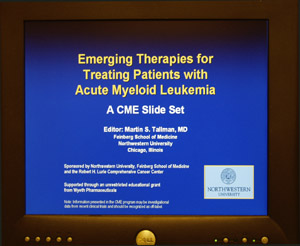Online Continuing Medical Education Available
 In collaboration with a commercial medical communication company and Children’s Memorial Hospital (CMH), the Feinberg School of Medicine is offering options for receiving continuing medical education (CME) credits online.
In collaboration with a commercial medical communication company and Children’s Memorial Hospital (CMH), the Feinberg School of Medicine is offering options for receiving continuing medical education (CME) credits online.
“Our faculty members serve as the course directors who develop the content,” says Genevieve Napier, director of CME at the Feinberg School. “Then our office reviews it to make sure the program is in compliance with the Accreditation Council for Continuing Medical Education. The courses are valid for CME credit for one to two years, depending on the program, but must be updated at least once every two years.”
Course offerings may be found at www.cme.northwestern.edu/distance_learning.htm. After creating an individual profile, the physician signs in and goes through the program. Some use an interactive, case-study format in which the participant chooses among treatment options for the care of a “virtual patient” and receives feedback before moving on to the next scenario. “After completing the cases, you take a test, and if you pass, you can print out your CME certificate right away,” say Napier. Other offerings use .pdfs or PowerPoint presentations followed by a test scored online.
CMH’s marketing department, working closely with the editors of The Child’s Doctor and CME physician director Wayne Franklin, MD, in June 2004 launched a quarterly e-mail newsletter for physicians that offers free, online CME and news on clinical, academic, and research endeavors. The first issue was sent via e-mail to more than 14,000 physicians nationwide. The second issue featured online multimedia presentations on four topics: pediatric allergic bowel disorders, autism, pediatric hearing loss, and birthmarks. To keep costs down, subsequent issues are sent to physicians who have subscribed to the newsletter. Nearly 700 physicians have subscribed, a response rate of nearly 5 percent.
Users of the offerings come from across the nation and 33 countries, but only United States physicians who score at least 70 percent on the quizzes and complete the online evaluations qualify for CME credits.
Explains Amanda O’Rourke, program assistant in the Feinberg School’s CME office, “Their online grand rounds include audio and PowerPoint presentations followed by a test, each lasting about 30 to 45 minutes. They group them together in sequence so that you have the option of receiving an hour or two of CME credit.”
Visitors can review and subscribe to the newsletter at www.childrensmemorial.org/newsletter/default.asp or go directly to the CME pages at www.childrensmemorial.org/cme/.
All of the online offerings are free of charge and provide a way to supplement other CME courses approved by the Feinberg School. “Many of these have been made available through the collaboration of different medical communication companies and medical schools,” says Napier. “But they’ll never replace the major CME meetings held across the country because much of the learning comes from interacting live with your peers.”






